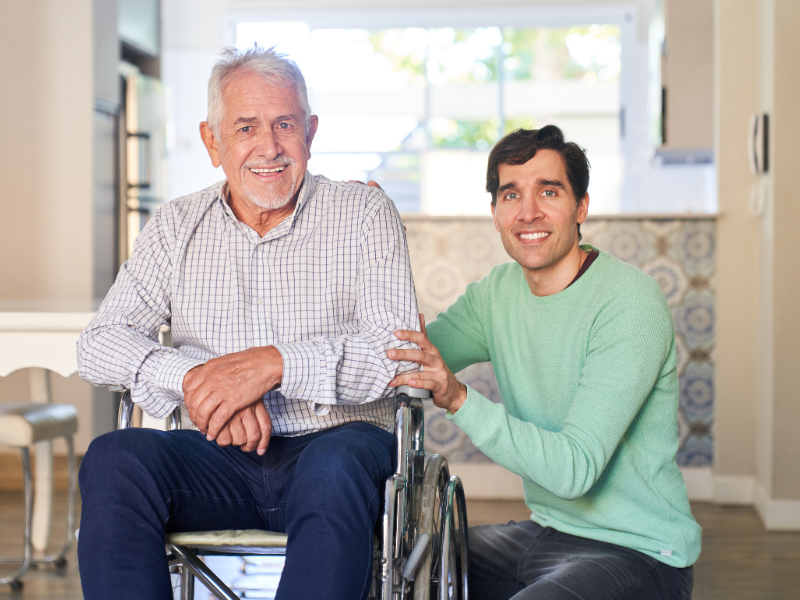Act FAST When Stroke Suddenly Strikes

Author: Debbie Humphrey
When I awoke the Monday following Easter, I was shocked to see news reports that Pope Francis had suffered a stroke early that morning, slipped into a coma, and died from resulting heart failure. Wow. I had just watched him deliver an Easter blessing and ride his Popemobile through crowds of the faithful in St. Peter’s Square.
Pope Francis was 88 years old, and he had recently been released from an extended hospital stay due to double pneumonia. His prognosis was likely guarded, and his physicians urged him to avoid Easter crowds, but “The People’s Pope” insisted that he bless the faithful and be present among them on the holiest of days.
In another sudden instance, I recall a friend in Kentucky telling me about her younger, 50-year-old sister who had suffered a stroke a few days before Thanksgiving several years ago, and because the woman’s husband acted FAST, she was successfully treated. Even though she still suffers from weakness on her right side and reduced stamina four years later, she’s alive, continuing her law career, and preparing for her youngest son’s wedding in August.
May is Stroke Awareness Month, and as FAST as a stroke took the life of Pope Francis and impacted the life of a woman much younger, so must we act FAST when stroke suddenly strikes.
How to Act FAST When a Stroke Strikes
According to the National Stroke Association (NSF), for every minute a stroke sufferer’s brain does not receive proper blood flow, two million neurons are negatively affected. The more neurons that are lost determines the overall impact on speech, movement, memory, and life.
Strokes are most common among seniors, but like I said, anyone at almost any age can suffer a stroke. If you ever find yourself in the presence of someone you think is having a stroke, a simple test recommended by the NSF, commonly known as Act FAST, can help you recognize the signs of a stroke:
Face – Ask the person to smile. Does one side appear droopy or unresponsive?
Arms – Ask the person to raise both arms. Does one tend to angle downward?
Speech – Ask the person to repeat a simple phrase. Does the speech sound slurred or strange?
Time – If you observe any of these signs, call 911 immediately!
Other stroke symptoms to watch for include:
Numbness or weakness of face, arm, or leg, especially on one side of the body.
Confusion, trouble speaking or understanding speech
Trouble Seeing in one or both eyes
Trouble Walking, dizziness, loss of balance or coordination
Severe Headache with no known cause
Please remember these FAST guidelines if someone appears to be having a stroke. I cannot emphasize enough the importance of FAST action when a stroke is suspected.
In the case of my friend’s younger sister, FAST action saved her life. She still suffers from the long-term effects; however, the woman is driven to overcome them and live her best life.
Seniors who suffer a stroke may not fare as well. In these instances, Home Helpers provides support for stroke recovery. Our stroke recovery services include:
- Assistance with Activities of Daily Living: Our caregivers are available to help with activities of daily living, such as bathing, dressing, and grooming, to ensure stroke patients can maintain their hygiene and dignity.
- Personal Care and Hygiene: We provide personalized care plans that focus on the needs of each stroke patient, including assistance with personal care and hygiene tasks.
- Meal Preparation and Diet Monitoring: Proper nutrition is essential for stroke recovery. Our caregivers can help with meal preparation and diet monitoring to ensure stroke patients eat nutritious meals, supporting their recovery.
- Medication Reminders and Management: Stroke patients need to take their medications as prescribed. Our caregivers can provide reminders and assistance with medication management to help prevent complications.
- Mobility and Transfer Assistance: Stroke survivors may experience mobility challenges. Our caregivers provide safe mobility and transfer support to help stroke patients safely move around their homes.
- Companionship and Emotional Support: Stroke recovery can be a lonely journey. Our caregivers provide companionship and emotional support to help stroke patients stay engaged and motivated throughout their recovery.
Our caregivers are skillfully trained to handle the complexities of post-stroke care and are dedicated to providing the support needed for a safe and effective recovery at home.
When stroke impacts your life or the life of someone you love, the compassionate caregivers at Home Helpers are available to provide these specialized care services as well as recuperative care, 24-hour in-home care, respite care, wellness calls, 24/7 monitoring devices, and more.
I am happy to offer a FREE Consultation to assess specific needs and develop a comprehensive care plan to make life easier for stroke survivors so they stay independent in their homes for as long as possible.
We, at Home Helpers® Clearwater, are honored to have been ranked among the Activated Insights Top 100 Leaders in Experience for home care providers in 2025 and to have received the Best of Home Care® Provider of Choice, the Best of Home Care® Employer of Choice, and the Best of Home Care® Leader in Experience Awards in 2025, along with the Caring Super Star 2025 Award.
Home Helpers Clearwater proudly serves male and female seniors, veterans, and differently abled individuals in Bayonet Point, Clearwater, Clearwater Beach, Dunedin, Gulfport, Holiday, Hudson, Largo, Madeira Beach, New Port Richey, North Redington Beach, Oldsmar, Palm Harbor, Pass A Grille, Pass A Grille Beach, Port Richey, Redington Shores, Safety Harbor, Saint Petersburg, Seminole, South Pasadena, Tarpon Springs, Tierra Verde, Treasure Island, Trinity, and surrounding areas. Home Helpers®…we are Making Life Easier® 727.942.2539
Source:
